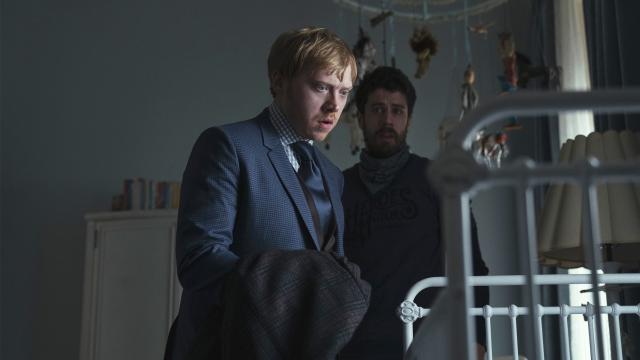Apple TV+’s mysterious Servant“from M. Night Shyamalan and Tony Basgallop”begins streaming Friday. The unsettling atmosphere of the show is achieved in part due to its fantastically moody score. Today, Gizmodo is debuting an exclusive track from the show and we got to talk to composer Trevor Gureckis, too.
Servant is…an odd one, but I’m looking forward to folks getting to watch it so I can talk about it more. Indeed, one of the best parts of the series is the dramatic music from Gureckis, who previously worked on films like Bloodline and The Goldfinch. In a recent email interview, we discussed his creative process with Shyamalan as well as recent music trends in horror (though Servant is more of a psychological thriller).
If you’re into the sounds after watching Servant, Lakeshore Records will release the 45-track album exclusively on Apple Music November 29, it then gets a digital release on iTunes January 4, with all other digital platforms receiving it on March 7, 2020. For now, check out the track “Dare Me” exclusively on Gizmodo. Our interview with Gureckis follows.
Gizmodo: Tell us a bit about the creative process between you, Tony Basgallop, and M. Night Shyamalan. Was there an overarching sound for Servant they already had in mind when you joined the project?
Trevor Gureckis: Night directed the first episode of Servant himself, and in general he doesn’t like to use temp music so that gave us space to search for the sound that would define the score. So instead of going at it like, “What’s the opening cue for the opening shot?””we explored ideas freely for a while and he would give me feedback as to whether or not I was on the right track. So these would be titled “Idea 1,” “Idea 2,” etc.
I think by “Idea 8″ I was starting to hit a stride that Night was digging and was working with the picture. It was subtle, transparent, eerie but not outright horror. And by that point, I was using lots of small instruments like crotales, glockenspiel, violin, and prepared piano.
Gizmodo: Were you clued into the entire story early on in order to do the work or did they keep secrets even from you?
Gureckis: In some cases, things were definitely kept secret. I had scripts for most of the series before I started working on it, so I knew the direction we were going, but only so far. During the production process, I was composing as they were shooting/editing and Tony was revising and writing scripts I wasn’t allowed to see. That definitely added to the thrill of working on the next episode.
Gizmodo: Can you describe the main thematic throughline of the score? The series has a lot of unknowns as we go along but the music always hints at something lurking beneath the surface.
Gureckis: There are a few different themes tied to the characters and ideas in the series as a whole, but I think one of the biggest concepts that I try to capture is the struggle that the family has with reality. That tension is always there. That’s something that Night was always interested in keeping present and I hope it has the audience on its toes because there are no simple answers here.
Musically, I explored this with a few notable instrumentation elements. Whaling and bowed instruments which at times feel otherworldly. Against that, we have these intimate moments of bells and piano which are lyrical and are more of the drama of the moment. There’s plenty of cross-pollination of these ideas when it made sense in the scene or even transformation of these concepts in more thriller-like moments. But I hope when watching or listening to the score, this struggle comes across.
Gizmodo: What’s your approach to the use of strings in the soundtrack, especially in a time where it feels like a lot of horror, or at least horror-adjacent, scores lean heavily on them? Not that there isn’t a long history as well (Psycho).
Gureckis: Strings can definitely be a heavy-handed scoring device, if you’re not careful. While it was shocking and thrilling with Psycho by Bernard Herrmann, that same screeching sound can be predictable these days.
I was coming at the use of strings less of a tool of a genre and more of a tool for this particular score. Playing behind the bridge, detuning it, hitting it with a pencil, applying overpressure all in an effort to create a lot of dynamic and expressive gestures. There’s a lot of space and transparency in this score and I’d often use crotales or other bells like pillars. To me, that gave room for the non-structured musical ideas, like the stuff I was getting out of the violin”or woodwinds which were fluttering and doing multi-phonics and other weird sounds to create an unsettling world.
Gizmodo: Most of your work has been film-based, can you tell us a bit about the difference in approach or execution in scoring a whole series?
Gureckis: I’d say the biggest difference is not necessarily the speed of which you have to work”on a big feature film you’re going to have to write two to three minutes a day as well. But it’s the duration. It’s a long haul. More of a marathon than anything.
By the end, you’re starting to really test your brain and creativity if you have anything more to offer other than the same old ideas. But if it’s really in your DNA at that point, like this score is for me, it becomes second nature. You just don’t want your experience to score it alone so it’s good to shake things up…maybe cello next season!
Servant begins streaming with the first three episodes November 29 on Apple TV+ and it was just given a second season order.
